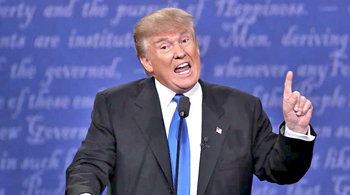Washington, Nov 28: President-elect Donald Trump asserted that he would have won the US popular vote were it not for "millions of illegal" ballots, while dramatically sharpening his criticism of a recount in Wisconsin, calling it "a waste of time."
 With the recount threatening to revive debate about the legitimacy of Trump's victory -- his rival Hillary Clinton won far more popular votes, while he carried the all-important Electoral College count -- Trump and his aides pushed back hard yesterday.
With the recount threatening to revive debate about the legitimacy of Trump's victory -- his rival Hillary Clinton won far more popular votes, while he carried the all-important Electoral College count -- Trump and his aides pushed back hard yesterday.
Trump let fly a series of early-morning tweets in which he quoted Clinton about the need to respect the electoral process, while continuing to wage an extraordinarily public battle over the makeup of his future cabinet.
By late afternoon, Trump furthered that "In addition to winning the Electoral College in a landslide, I won the popular vote if you deduct the millions of people who voted illegally."
Trump had warned before the election that the result might be "rigged," but he had offered no such complaint after his unexpected victory November 8 -- until now.
Neither he nor any of his aides has offered any evidence of the "millions" alleged to have voted illegally, nor did Trump explain why he would oppose a recount if illegal voting was such a serious problem.
No election observers have pointed to any such widespread fraud. It was the latest bizarre twist in an increasingly rough and jolting presidential transition, with much of it fought on social media and on the nation's television screens.
Trump's top aide Kellyanne Conway, in the middle of the turbulence, appeared on Sunday to at least hint that if the Clinton team pushes too hard on the Wisconsin recount, the president-elect might rethink his vow not to seek Clinton's prosecution for using a private email server when she was secretary of state.
While the recount was requested by Green Party candidate Jill Stein, who received a minute fraction of the total vote in Wisconsin, Clinton's campaign has said it would join the process despite having seen no irregularities in the White House contest so far.
Conway said on ABC that while Trump was being "magnanimous" toward Clinton, "I guess her attitude towards that is to have her counsel go and join this ridiculous recount."
And Reince Priebus, Trump's chief of staff, said that while the president-elect is not "seeking methods and ways to persecute and prosecute Hillary Clinton," Trump would probably be "open to listening" should any new findings against her emerge from future investigations.





Comments
Add new comment